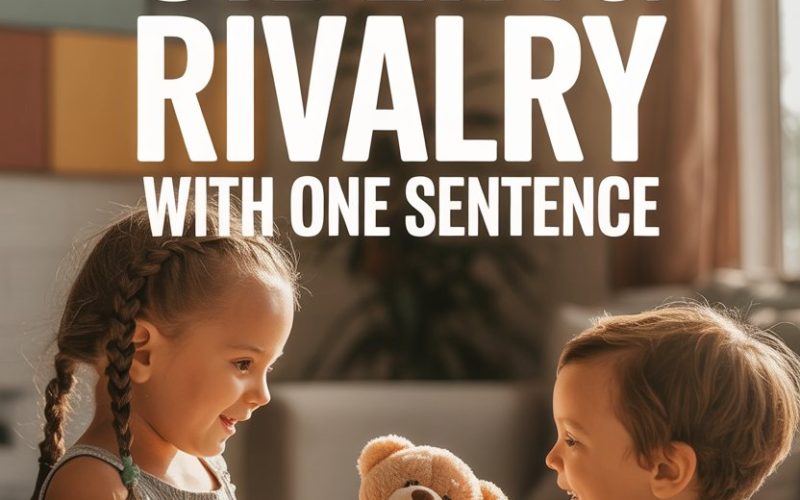If you have more than one child and have never witnessed a squabble over the last fish finger, your home might be a parallel universe—or you have a pet goldfish with a suspiciously strong appetite.
For the rest of us, sibling rivalry isn’t just normal; it’s practically a rite of passage.
In fact, research from the University of Cambridge found that children between ages three and seven clash with their siblings an average of 3.5 times per hour.
Yes, you read that right. Every. Single. Hour.
No parent dreams of moonlighting as a referee.
The good news: sometimes, stopping sibling rivalry doesn’t require a family summit or a deep dive into child psychology. Sometimes, one magic sentence can turn chaos into calm.
What’s Really Behind Sibling Rivalry
Children don’t bicker for sport (well, not always). Sibling rivalry springs from a need for attention, a quest for fairness, or good old-fashioned boredom.
It can rear its head over toys, screen time, who gets the last pancake, or who gets to sit behind mum’s seat in the car.
It’s tempting to believe sibling fights mean you’ve failed as a parent or that your children are destined for separate Christmases.
Actually, sibling spats often signal perfectly healthy relationships—siblings are learning how to stick up for themselves, argue, compromise, and recover.
Still, no one wants to hear “Mum! He’s breathing on me!” for the sixth time before breakfast.
The One Sentence That Changes Everything
Ready for the magic? Here it is:
“I see two children who both want something, and I trust you can find a way to work it out.”
This isn’t just a gentle suggestion. It’s a gentle nudge wrapped in trust, confidence, and a pinch of accountability.
Why This Sentence Works
This isn’t just a nice turn of phrase—there’s science behind it.
Psychologists from the University of Toronto highlight that when children believe their parents trust them to handle conflicts, they feel respected and empowered. The phrase reframes the conflict.
Instead of swooping in as judge and jury, you’re handing the gavel back to the tiny people with the most skin in the game.
It’s not about ignoring or dismissing the problem. You’re acknowledging both children’s needs (“I see two children who both want something”) and expressing faith in their ability to work it out.
This one-two punch of empathy and responsibility can dial down drama faster than you can say “screen time.”
What to Do After You Say It
Releasing control is terrifying. You might want to hover nearby, just in case, but give your children a minute (or five) to figure things out.
Most of the time, they’ll surprise you.
If your kids are young, you might need to model what working it out looks like. For little ones, that might mean saying, “Would you like to take turns?” or “What’s a solution you both feel good about?” But resist the urge to solve it for them.
The goal is to let them build those conflict resolution muscles—even if things wobble at first.
What If They Can’t Work It Out?
Let’s be real—sometimes, leaving it to the kids will end in tears, shrieks, or a dramatic recitation of injustices.
If the volume escalates or someone’s about to weaponize the remote, step in with calm curiosity: “What have you tried so far?” or “Is there another way to share?”
You’re not there to settle the fight; you’re coaching the process. If things really go off the rails (picture a full-scale cushion war), separate them and encourage a breather.
Emotions need space to deflate before brains can reboot.
When to Step In
Experts agree: not every squabble needs your intervention, but some definitely do. If someone is in physical danger, if there’s persistent bullying, or if the argument is relentless and cruel, step in immediately.
Set clear boundaries—“We don’t hurt each other”—and give everyone time to cool off.
Most of the time, though, your trust (even if it’s feigned at first) helps siblings develop resilience and respect—a rare and valuable combination.
Common Pitfalls Parents Fall Into
Bless us, we’re only human. The urge to keep the peace is strong—but sometimes our well-meaning habits accidentally stoke the rivalry flames.
Taking Sides: Even if it’s obvious who started it (the guilty smile says it all), try not to play detective. Focusing on the solution, not the who-did-what, keeps things on track.
Comparing Children: “Your sister always tidies up” will only earn you eye rolls and a full-scale mutiny.
Micromanaging: If you referee every squabble, your children might decide drama is the quickest route to attention.
Being aware of these traps can help you sidestep them—most of the time.
Tweaking the Magic Sentence for Your Family
Like all parenting hacks, one size never fits all. Tweaking the sentence to match your children’s ages and personalities works wonders.
For tiny humans: “You both want the toy. I know you can find a way to share.”
For tweens with the emotional range of a Shakespearean actor: “It sounds like you’re both frustrated. I’m here if you need ideas, but I know you can sort it.”
For teens: “You both care about this. I trust you’ll figure it out—and if not, the WiFi password is going on holiday.”
Okay, maybe don’t threaten the WiFi (unless desperate), but you get the idea.
Building the Skill Over Time
The beauty of this approach? It’s not just a fix for today’s squabble over who gets the last biscuit. It’s a long game.
Each time you use the sentence, you’re helping your children build real-life skills: negotiation, empathy, compromise, and the all-important art of backing down gracefully.
Clinical psychologist Dr. Laura Markham recommends giving children just enough support to succeed, but not so much that you rob them of the chance to grow.
Like riding a bike, it’s wobbly at first—but soon, they’re balancing with fewer spills.
What About When Sibling Rivalry Isn’t Just Bickering?
If you’re seeing constant power struggles, hurtful put-downs, or one sibling always getting the short end, it’s worth digging deeper.
Sometimes rivalry masks bigger feelings: jealousy, low self-esteem, or feeling left out.
Psychologists suggest carving out one-on-one time with each child (even ten minutes a day) to refill their emotional tanks.
If you’re concerned, don’t hesitate to reach out to a child psychologist for advice—sometimes an outside perspective helps spot patterns you might miss.
Stories from the Trenches
Real parents have seen this approach work wonders. Take Jess, a mum of three in Manchester: “I started saying, ‘I trust you’ll work it out’ instead of solving every argument.
At first, my kids looked at me like I’d sprouted a second head, but now they actually argue less—and sometimes even team up against me. Progress?”
Or Samir, a dad in Birmingham: “Giving my kids a chance to sort things themselves felt risky, but they’re more creative with solutions than I’d ever be.
One day, they flipped a coin over who got the last chocolate bar. I nearly cried.”
Kids want to feel trusted. Sometimes, that’s all it takes to spark cooperation (well, trust and maybe the occasional bribe—no judgment).
Making It Stick
Consistency is key. The more you use the magic sentence—and back it up with real trust—the more your children will surprise you.
Sure, you’ll still referee the occasional blowout, but you’ll also catch moments of quiet negotiation and even, dare I say it, teamwork.
Keep your cool, laugh when you can, and lower your standards for furniture longevity. Your children are learning skills they’ll use long after they leave your house (and hopefully, your snacks).
Keeping the Peace for the Long Haul
Sibling rivalry won’t vanish overnight.
But with a single sentence and a bit of faith, you’re nudging your children toward independence, empathy, and lifelong friendship (or at least, mutual tolerance).
And if all else fails, you can always hide in the pantry with the last biscuit.




